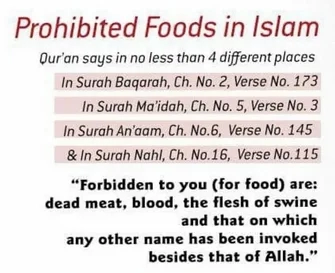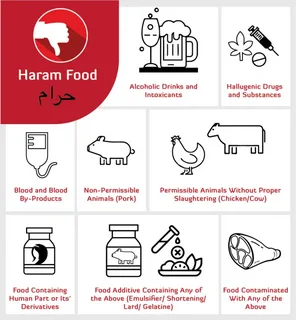In the rich tapestry of Islamic traditions, dietary guidelines hold a significant place. Muslims adhere to a set of principles that dictate what is permissible (Halal) and what is forbidden (Haram) when it comes to food consumption. Understanding and respecting these guidelines is not just a matter of religious observance but also a pathway to spiritual fulfillment, in this article on Arabian Tongue we will explorer What are forbidden food in Islam.
Halal and Haram: Understanding the Concepts

At the core of Islamic dietary laws are the concepts of Halal and Haram. ‘Halal’ translates to ‘permissible’ and includes foods that comply with Islamic law. On the flip side, ‘Haram’ means ‘forbidden,’ indicating foods that violate these laws. This duality sets the foundation for what Muslims can or cannot consume, underscoring the importance of these concepts in their daily lives.
What are forbidden food in Islam?

Certain foods are unequivocally prohibited in Islam. Foremost among them is pork and its derivatives. The Quran explicitly forbids the consumption of pork, considering it impure. Additionally, blood and blood products, as well as the meat of carnivorous animals, fall under the category of prohibited foods, emphasizing the need for adherents to be vigilant about their dietary choices.
- Haram (forbidden): These are absolutely prohibited and considered sinful for Muslims to consume.
- Makruh (discouraged): While not strictly forbidden, these foods are discouraged, and it is recommended to avoid them.
- Pork and its products: The consumption of pork and pork products is strictly forbidden in Islam. This prohibition is explicitly mentioned in the Quran.
- Intoxicants: Consuming any form of intoxicants, such as alcohol or recreational drugs, is considered haram.
- Carnivorous animals and birds of prey: Animals and birds that have fangs or talons are generally considered haram. Examples include lions, tigers, eagles, and vultures.
- Dead meat (carrion) and blood: Muslims are prohibited from consuming dead animals that have not been slaughtered in the name of Allah, as well as blood.
- Animals slaughtered in the name of someone other than Allah: The proper method of slaughtering animals involves invoking the name of Allah at the time of slaughter.
- Animals killed in a brutal manner: Islam emphasizes humane treatment of animals, and any meat obtained through cruel or excessively painful methods is considered haram.
- Food dedicated to idols or other deities: Any food that is dedicated to deities other than Allah is considered haram.
It’s important to note that these guidelines are observed by Muslims who adhere to Islamic dietary laws, and individual interpretations may vary. Additionally, there are differences in dietary practices among various Islamic sects and schools of thought. Muslims are encouraged to seek guidance from religious authorities for specific questions related to dietary laws.
Cross-Contamination Concerns
The issue of cross-contamination poses challenges in adhering to Islamic dietary laws. Muslims are urged to ensure that their food is prepared separately from non-Halal items to maintain the permissibility of their meals. This requires careful consideration in both domestic and commercial food preparation settings.
Prohibited Methods of Slaughter
Islamic slaughter, known as ‘Zabiha’ or ‘Dhabiha,’ involves a specific method that adheres to religious guidelines. Other methods, such as stunning, are considered impermissible. Understanding and respecting these guidelines are essential for ensuring the meat is Halal, highlighting the significance of the process in Islamic dietary practices.
Exceptions and Considerations
While the prohibitions are clear, there are situations where consuming otherwise prohibited foods may be allowed. Certain exceptions exist, and Muslims are encouraged to consult with religious authorities to navigate such scenarios, striking a balance between adherence to dietary laws and practical considerations.
The Spiritual and Health Aspects
Adhering to Halal dietary guidelines extends beyond religious obligations; it holds spiritual and health benefits. The act of mindful eating becomes a form of worship, fostering a connection between the physical and spiritual aspects of life. Additionally, the emphasis on clean and wholesome foods contributes to overall well-being.
Cultural Influences on Halal Food
Halal practices can vary across different cultures, reflecting diverse interpretations of Islamic dietary laws. It becomes essential for individuals to balance their cultural practices with the religious guidelines, ensuring that the food they consume aligns with both aspects of their identity.
Educational Initiatives
Education plays a pivotal role in promoting awareness about Halal dietary practices. Accessible resources and initiatives help individuals, both Muslims and non-Muslims, understand the significance of these guidelines. This education fosters respect and appreciation for diverse dietary choices in multicultural societies.
Challenges in Adhering to Dietary Laws
Navigating modern food markets, where non-Halal options abound, poses challenges for adherents. Striking a balance between societal norms and religious obligations requires a nuanced approach. Muslims must be equipped with the knowledge and resilience to make choices that align with their faith.
Controversies Surrounding Halal Certification
The issue of Halal certification has sparked debates in various circles. Critics question the transparency and authenticity of certification processes. Addressing these concerns is crucial for maintaining trust and ensuring that individuals can confidently choose Halal-certified products.
Respecting Others’ Dietary Choices
Living in multicultural societies means encountering diverse dietary preferences. Muslims, in adhering to their own dietary laws, are encouraged to understand and respect others’ choices. This inclusivity fosters a sense of community and harmony amid culinary diversity.
Learn Now: Learn Quran Online
FAQs
Can Muslims consume any type of meat as long as it's not pork?
While pork is explicitly forbidden, Muslims must also adhere to specific guidelines for the slaughter and preparation of other meats to ensure they are Halal.
Are there exceptions for consuming prohibited foods in emergencies?
In exceptional circumstances, where there is a risk to life, Muslims may be allowed to consume otherwise prohibited foods after consulting with religious authorities.
How do cultural practices influence Halal food choices?
Cultural interpretations may lead to variations in Halal practices. It's essential to strike a balance between cultural identity and religious guidelines.
What role does education play in promoting awareness of Halal practices?
Education is crucial in fostering understanding and respect for Halal practices, both within Muslim communities and among non-Muslims.
Equipping oneself with knowledge, seeking Halal alternatives, and maintaining resilience are key in navigating challenges in diverse food environments.
Conclusion
In navigating the intricacies of prohibited foods in Islam, it becomes evident that adherence to dietary laws extends beyond religious obligation—it becomes a holistic way of life. From spiritual fulfillment to health benefits, the significance of Halal practices reverberates in various aspects of an individual’s existence.


